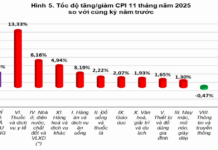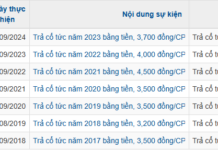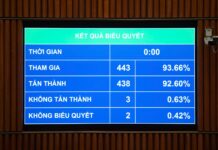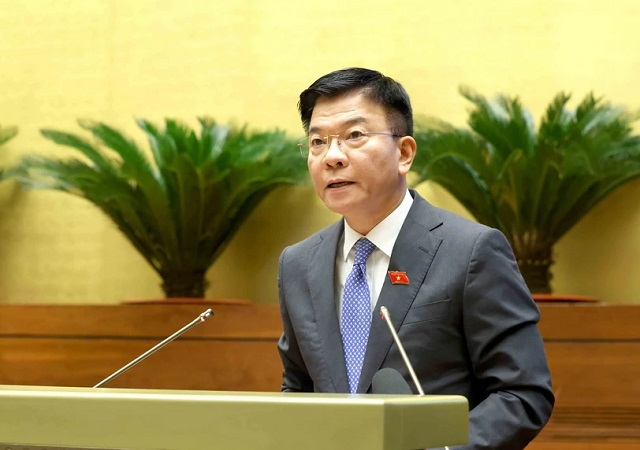
Deputy Prime Minister Le Thanh Long presents the Proposal for the Law on State Capital Management and Investment in Enterprises. (Photo: Phuong Hoa/ VNA)
|
Continuing the program of the 8th working session, the 15th National Assembly met in plenary session on the morning of November 23 to hear the presentation of the Proposal and the Verification Report on the draft Law on State Capital Management and Investment in Enterprises.
The draft Law on State Capital Management and Investment in Enterprises was constructed based on closely following the purpose, guiding principles, and concretization of the content of the six policy groups in the proposal for building the Law, which was passed by the Government and presented to the Standing Committee of the National Assembly for their consensus and then to the National Assembly for approval. It aims to concretize the guidelines, policies, and directions of the Party in Resolution No. 5 of the 12th Central Committee, the Documents of the 13th National Congress, and international commitments that Vietnam has signed regarding the management and investment of state capital in enterprises. It also aims to address difficulties and problems in the implementation of Law No. 69/2014/QH13.
The draft Law on State Capital Management and Investment in Enterprises was developed to perfect the institutional framework and stabilize the legal environment for state capital investment in enterprises. It aims to create a comprehensive and stable legal corridor for the management and investment of state capital in enterprises, ensuring respect for and enhancing the autonomy and accountability of enterprises, along with strengthening state inspection and supervision in capital management and investment in enterprises. It ensures that enterprises operate according to market mechanisms in industries and fields of business as required by the state (the owner).
At the same time, it aims to enhance the role and effectiveness of state-owned enterprises commensurate with the state capital invested in them, ensuring that enterprises with state investment play a leading and pivotal role in the economy, and mobilizing and promoting all resources of the state-owned economic sector in general and state-owned enterprises in particular for socio-economic development.
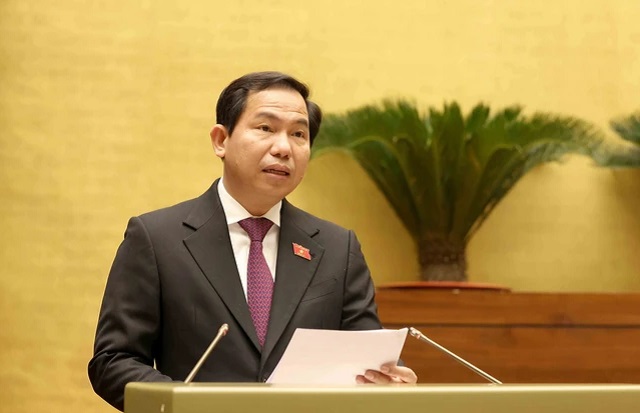 Chairman of the Finance and Budget Committee of the National Assembly, Le Quang Manh, presents the Verification Report on the draft Law on State Capital Management and Investment in Enterprises. (Photo: Phuong Hoa/ VNA)
|
The Finance and Budget Committee of the National Assembly found that the regulation to allocate up to 50% of post-tax profits to the Development Investment Fund in 100% state-owned enterprises is appropriate.
The draft Law has adjusted the regulation on the purpose of using the Development Investment Fund so that it will be implemented according to the Government’s regulations.
The Finance and Budget Committee agreed with the draft Law but proposed supplementing the draft Decree guiding the implementation of this content to ensure compliance with the Law on Promulgation of Legal Documents.
At the same time, the draft Decree should specifically regulate the authority, decision-making, scope, and content of the use of the Fund, ensuring that state capital, after being invested in enterprises, is considered the property and capital of those enterprises.
Regarding the rearrangement and restructuring of state capital investment in enterprises (Chapter V), the Finance and Budget Committee basically agreed with the principles of rearranging and restructuring state capital investment in enterprises as mentioned in the draft Law.
However, the Committee proposed that the drafting agency review and supplement some principles to ensure compliance with the spirit of Resolution No. 12-NQ/TW, dated June 3, 2017, of the 5th Plenum of the 12th Central Committee on “Continuing to restructure, renew, and improve the efficiency of state-owned enterprises.” This includes applying advanced asset valuation methods suitable for the market mechanism, ensuring that state capital and enterprise value are fully and reasonably valued, and that the process is transparent and publicly disclosed. It also includes supplementing regulations on handling cases of undervaluing assets and enterprise value, causing state capital loss, and specifying the responsibilities of independent valuation consulting organizations in asset valuation and enterprise value determination.
Do Binh









